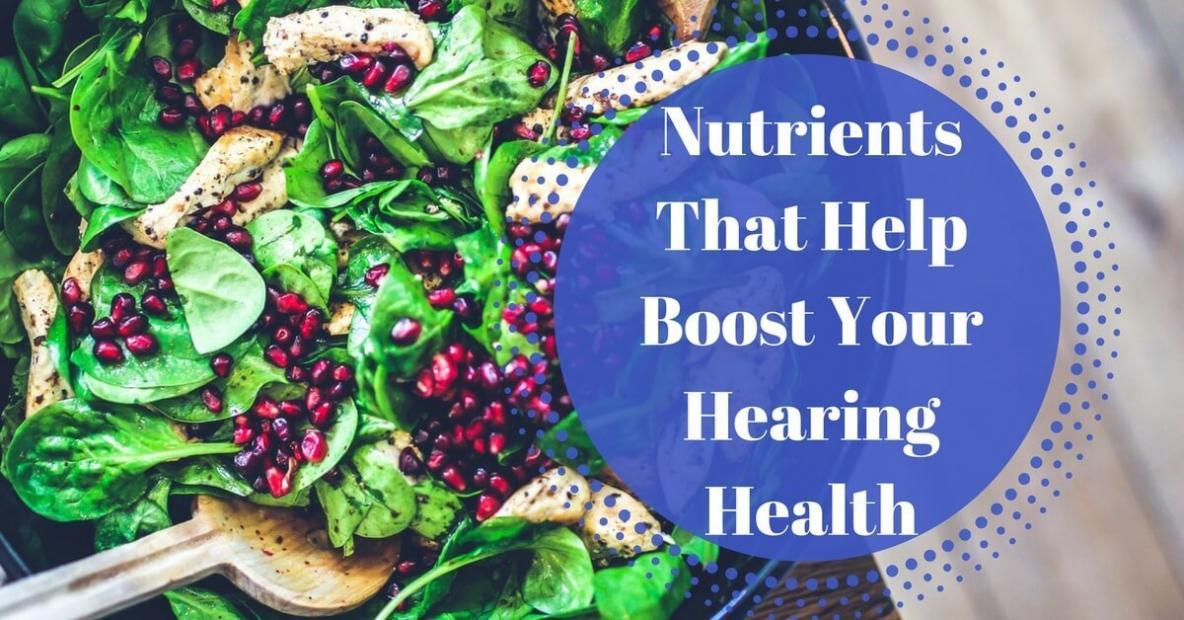0% financing available. Up to 3-year loss and damage guarantee.

Nutrients That Help Boost Your Hearing Health
- Navigating the Conversation: The Significance of Thoughtful Disclosure in Hearing Loss - December 10, 2023
- The Sound of Dreams: Understanding How Hearing Loss Impacts Dreaming - November 7, 2023
- Traveling Effectively with Hearing Aids - October 16, 2023
We know that a healthy, balanced diet ensures overall well-being, from keeping our blood sugar levels down to boosting our energy levels throughout the day. Did you know that there are certain nutrients in our diet hat help boost our hearing health as well?
With heart disease, arthritis, and hearing loss as the top three most common medical conditions in the United States, it’s no wonder that many Americans are taking steps toward improving their diets.
Here, we examine the results of two studies that point us toward nutrients we should include in our diets to improve our hearing. Also, we offer an overview of foods rich with these nutrients.
Antioxidants May Help Prevent Hearing Loss, According to University of Michigan Study
At the Kresge Hearing Research Institute, based at the University of Michigan, Dr. Colleen Le Prell’s research has indicated that “high doses of certain antioxidants reduce noise-induced hearing loss in animals when taken both before and after loud noise.” Dr. Le Prell’s work was supported by the American Hearing Research Foundation.
In this study, Dr. Le Prell gave guinea pigs high doses of vitamins A, C, and E, as well as magnesium, before and after exposure to noise. Over the course of five days, it was found that this treatment was effective in preventing noise-induced hearing loss. Dr. Le Prell says, “Vitamins A, C, and E and magnesium worked in synergy to prevent cell damage.”
In a report from the American Hearing Research Foundation, “pre-treatment presumably reduced reactive elements called free radicals that form during and after noise exposure and noise-induced constriction of blood flow to the inner ear…In the past 10 years, scientists have learned that noise-induced hearing loss occurs in part because cell mitochondria in the ear churn out damaging free radicals in response to loud sounds.” Antioxidants help to reduce the impact of these free radicals on our hearing.
Omega-3 Fatty Acids Have Anti-Inflammatory Properties to Help Strengthen Blood Vessels of the Inner Ear
In an article from the Daily Sentinel, Dr. Joe McDermott, AuD, has found that “people who eat two or more portions of fish per week are 42% less likely to develop presbycusis [age-related hearing loss] compared with those who do not eat fish on a regular basis.” Fish are rich in omega-3 fatty acids, especially salmon, tuna, and sardines.
The inner ear environment is a sensitive place, and it receives much of its oxygen supply from blood vessels. Healthy blood ensures proper oxygen supply to the inner ear hair cells, which translate sound vibrations into neural signals which are registered by the brain as sound. Omega-3 fatty acids have “anti-inflammatory properties that help strengthen the blood vessels of the inner ear, thereby helping to protect against hearing loss,” reports the Daily Sentinel.
Nutrient-Rich Foods to Include in Your Diet to Support Hearing Health
A diet rich in antioxidants, folic acid, omega-3 fatty acids, and vitamins such as A, C, E, B12, magnesium, and zinc will support better hearing health. These nutrients protect against harmful oxidation in your inner ear, prevent free radical damage, and improve blood flow to your inner ear. You may find these nutrients in the list of foods below.
Rich Greens: Rich and leafy greens provide folic acid. Vegetables such as spinach, bell peppers, avocado, asparagus, broccoli, cabbage, fennel, collard greens, and romaine lettuce all provide a high level of folic acid. According to Dr. McDermott in the Sentinel, “People over the age of 50 years with folate deficiency have been reported to have a 35% higher risk of hearing loss.” Folate has also been found to help reduce tinnitus (ringing of the ears). Add a few fresh greens to your daily diet and protect your hearing!
Fish: What do salmon, tuna, and sardines have in common? All three are incredibly rich with omega-3 fatty acids, which help to strengthen blood vessels in your inner ear. Presbycusis, or age-related hearing loss, is one of the most common forms of hearing loss. Those who eat fish on a regular basis are at less risk of developing presbycusis than those who do not, according to Dr. McDermott.
Vitamins: There are a number of vitamins that have been found to support your hearing abilities. If you experience sudden hearing loss, zinc has been found to help. Zinc, which can be taken in a daily vitamin or can be found in chocolate or oysters, has been found to help prevent the onset of presbycusis. Vitamins A, C, and E have been found by Dr. Le Prell to help prevent against noise-induced hearing loss. You may find these vitamins in a large number of colorful fruits and vegetables, from oranges to bell peppers. Magnesium has also been found to help prevent hearing loss, according to Dr. Le Prell. Magnesium may be found in bananas, potatoes, artichokes, and broccoli.
If you are experiencing changes in your hearing, contact us at Advanced Tech Hearing for more information and to schedule a hearing test.
Advanced Tech Hearing Aid Centers
With three convenient Pennsylvania locations in Lancaster, New Holland, and Red Lion there is sure to be a location near you. Reach out to our friendly team today.
(717) 560-5023
